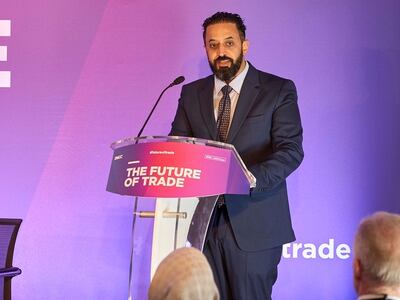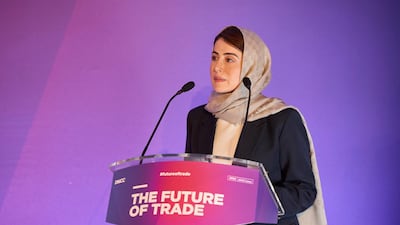Global trade is on track to continue on an upward trajectory in 2022 following a record-high of $28.5 trillion in 2021, and is forecast to remain resilient in the face of the war in Ukraine, soaring inflation and economic uncertainty, according to a report.
The Dubai Multi Commodities Centre’s Future of Trade 2022 report titled A New Era of Multilateralism painted an optimistic picture of how trade is this year expected to weather a multifaceted storm facing governments and businesses. Global trade looks likely to expand by 3 per cent this year, the authors said, lower than the 9.8 per cent growth seen in 2021.
Speaking at the launch of the report at Asia House, London, on Tuesday, Feryal Ahmadi, chief operating officer at DMCC, told The National the expected increase in trade stems from “a new era of multilateralism where countries focus on more regional bilateral agreements and the UAE is actually leading the way here”.
The report outlined how the UAE has 27 potential trade deals in the pipeline.
Russia’s invasion of Ukraine inflicted shocks on global supply chains, exacerbated existing stress on commodity markets amid the post-pandemic recovery, drove up oil prices and caused inflation to soar.
Ms Ahmadi said global trade appeared strong enough to overcome such knock-on effects in the months ahead and beyond.
“The Future of Trade report highlighted that trade is resilient,” she said. “If you look at 2021, trade hit a record high at $28.5 trillion and it does predict that trade [growth] might be slower in 2022 but it will nevertheless continue to grow.
“As we say, trade always finds the paths of least of resistance. So small regional agreements through technology, digitalisation, for adoption of sustainability regulations and standards — that is how we can cushion the blow basically of any unforeseen risks on events — and diversification as well.
“The results of the war in Ukraine are across the globe. You see rising oil prices, which impact commodity prices, and that has a knock-on effect on shipping costs, on supply chain challenges. You see soaring inflation as well that is leading to higher interest rates. That in turn leads to tighter financial conditions, which limits import demand for a lot of countries and also limits their ability to export.”
The DMCC laid out recommendations for governments and firms on how to lessen the blow from the geopolitical and economic shocks reverberating around the world. Firms were told they could shield themselves by increasing their focus on economic diversification to support sustainable initiatives against climate-related uncertainty in production.
Increased digitalisation will also go a long way to enable faster customs procedures, the report said.
World leaders were advised to introduce government-guaranteed bank loans to inject cash into supply chains during turbulent times, and make digitalisation a priority to promote greater supply chain efficiency and resilience.

Ahmed bin Sulayem, executive chairman and chief executive of DMCC, said global trade was likely to continue to benefit from the pent-up demand two years after the pandemic took hold, and beyond that there were long-term changes under way that should support cross-border trade including increased regionalism, strength in services trade, innovation, and climate politics.
“There is a joint imperative for the future of trade and the building of more crisis-resilient economies — financing the shortfalls in infrastructure and in trade finance,” he said. “Tackling both in a way that is environmentally sustainable will be crucial. So too will be closing the digital divide between countries and sectors to bring the benefits of global trade to all.”
The UAE is in a strong position to trade with global partners despite the climate of uncertainty, Ms Ahmadi said.
She said Dubai had “proven itself as an international and regional trade hub” and would “lead by example” in areas such as trade finance, innovation, digitalisation and sustainability.
The UAE’s hosting of the Cop28 UN climate change conference in November 2023 will serve as another opportunity for the country to showcase its strong focus on green energy and inspire other global entities, she said.
Alongside potential trade deals, the report also touched on the UAE's strengthening relations with Israel following the signing of the Abraham Accords in 2020.
Trade between the UAE and Israel is estimated to have exceeded $1 billion in the first quarter of 2022, the UAE’s Minister of State for Foreign Trade Dr Thani Al Zeyoudi told the World Economic Forum in Davos. Ms Ahmadi said an agreement between the two nations could result in the creation of up to 50,000 jobs in the UAE in the next five years.
To achieve net zero carbon emissions by 2050 the global community has to invest $273 trillion, the report said. The target refers to a call in the Paris Climate Agreement that said to limit global warming to no more than 1.5ºC over pre-industrial levels, emissions would have to be cut by 45 per cent by 2030 and reach net zero by the middle of the century.


